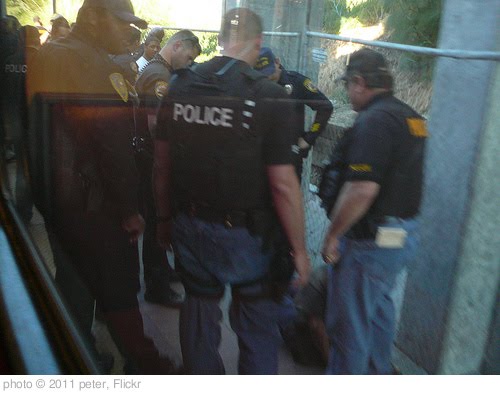Not too long ago, after reading a title like that (courtesy of the NYT), I'd wonder who the fools are that would oppose a dam. Jobs, opportunity, energy, water flow. Progress. These are things that the poor villagers need, surely...
But lately I've started asking who is it who benefits from such "progress".
Opponents said they would not give up the fight against the Belo Monte dam, which they said would flood a large part of the Xingu River basin, affecting local fishing and forcing tens of thousands of indigenous people from their native lands.
“We will not cede an inch,” said Antônia Melo, the coordinator of Xingu Vivo Para Sempre, a group based in Altamira, a city that will be partly flooded. “Our indignation and our strength to fight only increases with every mistake and every lie of this government.”Progress is yet another code word. Another sign of Newspeak.
We are protecting you. We are giving you access to fresh and healthy water and/or food and energy as well giving you jobs and equity and teaching you lazy leechers about responsibility.
But then you start questioning whether or not they truly need what they are being sold. And certainly for such a high cost.
The price of free capitalism, I suppose?
 |
| Q'eqchi' peasants mourning the assassinations of three young activists. |
On March 15, 2011, Guatemalan police, soldiers and paramilitaries began a series of violent evictions targeting Q’eqchi’ peasant communities in Panzos, Alta Verapaz. The purpose of the evictions were to stop the production of basic grains and convert the land to sugar cane and African palm for the production of biofuel. Hundreds of homes were destroyed, several people were killed in the attacks, and thousands lost their only source of food and income......
Helicopters fly overhead with armed men leaning out the door pointing guns at peasants below. Masked paramilitaries attack communities at night. Murderers remain free and community leaders are arrested on fraudulent charges. Hundreds of families have had their houses and crops burned to the ground, leaving them with hunger and a desperate struggle for survival...
The Guatemala Solidarity Project (GSP) strongly condemns continued repression against 14 q’eqchi’ communities in Panzos which were violently evicted in March by the Guatemalan government and biofuel corporations...
Thousands of q’eqchi’ peasants near Livingston, Guatemala had been anticipating February 14, 2011 as a possible day of joy and celebration. Instead it became a day of unbearable grief after the bodies of three missing leaders affiliated with Encuentro Campesino (Peasant Encounter) were found floating in a lake near Livingston, covered with bullet wounds.
Encuentro Campesino is a peasant and indigenous rights organization which political prisoner Ramiro Choc helped form. February 14 was the first day that Choc became eligible for release from prison, and the three were expected to participate in activities to pressure for his freedom.
But who cares, right? I mean, we're talking about access to bio-fuel, right? We're gonna need that sh*t soon because we're approaching peak oil, right? Ain''t it better than dirty dino-based oil? And won't the production of it (and the dam) give good jobs to the economically devastated people of Guatemala and Brazil?
These are what we tell ourselves. I know that I've been conditioned to believe such quandaries. But the truth is actually not that complicated. We need to ask other questions:
- Why are a people who live in such a bio-rich environment considered poor?
- Do they actually need jobs - or do they already have them?
- And not only jobs, but meaningful ones - ones that give them a sense of accomplishment and meaning?
Going back to Brazil:
Conservationists have become increasingly critical of Brazil’s efforts to protect the Amazon rain forest. Brazil’s deforestation numbers increased sharply over the past nine months, and the lower house of Congress last week approved a revision of the Forest Code that would open up protected areas to deforestation while granting amnesty to agribusiness developers for previous forest-clearing. The Senate has yet to vote on the measure.
“The government has an important choice — to go back to a future of wasteful publicly funded mega-projects and frontier chaos, or ahead, to the future of a sustainable and equitable green economy leader, with rule of law, good governance and a secure natural and investment environment,” said Stephan Schwartzman of the Environmental Defense Fund.
The $17 billion dam, which is expected to start producing electricity in 2015, would divert the Xingu River along a 62-mile stretch in Pará State. Environmental groups say it will flood more than 120,000 acres of rain forest and settlements, displacing 20,000 to 40,000 people and releasing large quantities of methane. The Ibama spokeswoman put the number of displaced people at 20,000 but insisted that no indigenous people would be removed from their lands.
There is a way out, a holistic change, a solution for all of this mess. It's living local, local sustainability. The idea is tied into a phrase attributed to Gandhi, "There is enough for everyone's need. But not enough for everyone's greed."
We don't need so much energy. We don't need to starve many while several gorge ourselves on fats. We just need to live within our means and share properly.
In the meantime, please support and spread the word about the Belo Monte dam project's destruction and the Guatemala Solidarity Project, as well as the people whose lives will be affected by these traps.








